Peter MALONE
Saturday, 18 September 2021 19:24
Road House
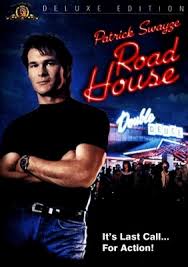
ROAD HOUSE
US, 1989, 114 minutes, Colour.
Patrick Swayze, Kelly Lynch, Sam Elliot, Ben Gazzara.
Directed by Rowdy Herrington.
Road House is a big, colourful action drama designed as a star vehicle for Patrick Swayze, after his success in Dirty Dancing. His character is a bit hard to believe, but he does his best in the role. He is a Ph.D. who is a great success as a controlling bouncer, cleaning up road houses and nightclubs.
He comes up against the powerful boss of the town, played with his usual sinister smile, by Ben Gazzara. In fact, the film is really a western set in the late '80s. Swayze is the gunfighter brought in to clean up the town. The townspeople are impotent against the wealthy man. He has his henchmen. The development of the plot parallels so many westerns until the final shoot-out. In this sense, Road House is an interesting example of how genres can parallel each other. The film was directed by Rowdy Herrington (Jack's Back) - and the film lives up to the director's name.
1. Interesting and enjoyable action drama? Justice? A 20th century western?
2. Panavision photography, the road house, the town, the countryside? Action?
3. The importance of the stunts, the bar-room brawls, special effects for violence?
4. The musical score, the range of music, the songs? The playing of music in the road houses? Dancing?
5. The film following the western outline: the town in need of cleaning up, the road house as the saloon, the owner and his gang of henchmen, violence, romance, deaths, the townspeople banding against the powerful owner, the shoot-out?
6. Swayze as Dalton, his western name? A man of action, his reputation, seeing him at work, the owner of the Double Deuce as persuading him to come, his stylish way of talking, his philosophical training and reading? Arrival in the town, watching people in the Double Deuce, his sardonic raising of eyebrows? Taking over, going into action, the dismissal of the unsuitable staff? Their hostility? The fight, the stitches, going to see Doc? Infatuated by her, the dates, falling in love? His car and his concealing it, getting the room in the barn, practising his martial arts, his lifestyle? Watching Wesley, meeting him, discovering the truth about him? Phone call to Wade, their friendship? The clashes in the Double Deuce, getting rid of unwanted people? The place being tidied up and improved? The fights out back with Wesley's henchmen? Their wanting revenge? The explosion in Red's store? Wesley confronting people in the Double Deuce? The truth about Doc and Wesley? The hold-up of the liquor and getting help? The fight after the burning of the farmer's house? Killing his opponent? Doc's reaction? The build-up to the confrontation, in the car, his revenge for Wade's death, going into the house, destroying the henchmen, the confrontation with Wesley? Reconciliation with Doc?
7. Wesley, his home, the parties, his power, meeting with Dalton? At Red's store? Holding up the liquor? His henchmen and his brutal treatment of them? His girl - and her doing the strip in the bar? The fires, the explosions? The build-up to the confrontation? In his own home, his callous presumption? His death?
8. Doc, her help in the hospital, relationship with Wesley, dates with Dalton, talking and communicating, in love, the sexual relationship, the disgust at the fight and his killing his opponent, in the final confrontation?
9. Wade, friendship, age, reputation, help, coming to the road house, participating in the fights, his being killed?
10. Red, friendship, his shop, protection money, the shop being burnt? The car dealer and the ruining of his cars? The farmer, the helicopter frightening the horses, his house burnt down? The owner of the Double Deuces and Wesley trying to put him out of business? The meeting, their arrival and shooting Wesley, their denials to the police? (The police in Wesley's pocket?)
11. The owner of the Double Deuces, his getting Dalton to come, the rules, sacking unsuitable staff, Wesley and his standover, at the end?
12. The sacked staff and their bitterness, Wesley's nephew, the return? Those who stayed, the girl and her singing, wisecracks? the fat man and the other bouncers loyal to Dalton?
13. The sketch of Wesley's men, his tough treatment of them, their viciousness, the fights? Jimmy and the confrontation and his death?
14. The modern actioner set in the American West paralleling the character and plots of the western?
Published in Movie Reviews
Published in
Movie Reviews
Tagged under
Saturday, 18 September 2021 19:24
Road to Denver, The
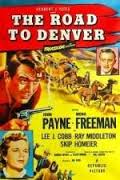
THE ROAD TO DENVER
US, 1955, 90 minutes, Colour.
John Payne, Mona Freeman, Lee J. Cobb, Skip Homeier.
Directed by Joe Kane.
The Road to Denver is almost the archetype of the conventional western. Two feuding brothers have to escape from Texas to Colorado. The kindly ranch-owner takes on the good brother, who clashes then with the bad brother. The daughter of the kind landowner falls in love with - possibly - each of them. The bad brother goes to work for the owner of the saloon who wants to take over the potential stagecoach. There is horse-rustling, shoot-outs - all in the tradition of the west.
1. Traditional western? Popular ingredients? Predictability?
2. The Utah settings and the atmosphere of the west? Landscapes, towns? Musical score?
3. Bill and Tom and their relationship, Bill bringing up Tom, Tom as a spoilt brat? The rodeo and his losing his bet, fighting, Bill breaking him out of jail? Going to Colorado? Changing their names? Bill getting the job, Tom picking the fight with the landowner because of the Civil War? The parting of the ways?
4. Bill as the solid upright citizen? Paying for his meal by washing up, Sutton seeing him, offering the job, Elizabeth, her cooking, at home? Working hard, getting the horses, getting them back from Donovan's men? The stagecoach, taking the gold, going along with Donovan's plan, giving him the box of rocks? The confrontation with Tom, Tom's inability to kill his brother? The happy ending?
5. Tom, the spoilt brat, the rodeo, picking fights, parting of the ways with Bill, the gambling with the cards in the saloon, meeting Donovan, working for him, shooting the horse-owner, going to jail, the plan for the gold, the confrontation with Bill, unable to shoot him? His attraction towards Elizabeth?
6. Sutton, benign, helping Bill, wary of Tom, the horses, the gold? His love for Elizabeth? Elizabeth, caring for her father, the cooking, the dance, Bill and Tom at the dance? Going to see Tom in the prison? The happy ending?
7. Donovan, typical saloon owner, the gambling, his men? Wanting to make money, going to the dance, rustling the horses, planning for the gold, the shoot-out?
8. The conventional characters at rodeos, ranchers, saloons, gamblers, the town dance, the sheriff? Popular ingredients of the American western?
Published in Movie Reviews
Published in
Movie Reviews
Tagged under
Saturday, 18 September 2021 19:24
RKO 281
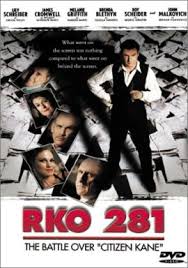
RKO 281
UK, 1999, 85 minutes, Colour.
Liev Schreiber, John Malkovich, Melanie Griffith, James Cromwell, Fiona Shaw, Brenda Blethyn, David Suchet.
Directed by Benjamin Ross.
RKO 281 is a Home Box Office telemovie produced and directed in the United Kingdom. The director is Benjamin Ross, who made The Young Poisoner's Notebook.
The film focuses on the making of Citizen Kane and draws on the Orson Welles archives for the screenplay by John Logan. The film opens with a background of Welles and his childhood - the child genius. It then moves to his success in the media, especially his terrifying people with the broadcast of The War of the Worlds in 1938, which listeners took to be an actual invasion from Mars. Feted at 24, he was then offered the opportunity to make any film he wanted at RKO. As the film opens, he is working with Herman Mankiewicz (John Malkovich). Invited to a banquet at San Simeon, the home of William Randolph Hearst and his mistress Marion Davies, he feels insulted by Hearst. He then has the idea of making a film about a media tycoon, modelled on Hearst. It is a secret project but the gossip columnists, especially Hearst's columnist Louella Parsons, make Welles promise that the film is not about Hearst.
Welles is an amateur at filmmaking and asks celebrated cinematographer Gregg Toland to work with him. He takes Mankiewicz name off the screenplay, which plunges Mankiewicz once more into alcoholic bouts. He clashes with people on the set, especially RKO head George Schaeffer (Roy Scheider).
Welles has moods which go up and down, he reinstates Mankiewicz and together they complete the film. Hearst hears about it from Hedda Hopper and sends Louella Parsons with an ultimatum. He meets the studio heads, especially Louis B. Mayer (David Suchet), to work together to prohibit the film's release. In the meantime, Hearst is losing money and faces bankruptcy. He is advised by Marion Davies to sell a lot of his possessions to cover his costs. Taking advantage of this, RKO released the film, which is a critical success - though did not succeed in its time at the box office.
Liev Schreiber, star of many independent films, is excellent as Welles. John Malkovich subdues a number of his mannerisms to make Mankiewicz a credible character.
1. A television movie for Home Box Office. The range of audience interest, film buffs, historians, the history of Hollywood? The cinema issues of production, publicity, gossip columnists? The pressures of production, powers that be, influence of moguls as the head of the studios as well as the role of Hearst.
2. The re-creation of the period, Hollywood, San Simeon, the studios? An atmosphere of Hollywood in the '30s?
3. Liev Schreiber as Orson Welles? The young boy genius and the background of his youthful success? His own memories of his childhood, his father, cutting off his alcoholic father? The effect of the rejection - and his repeating it with Mankiewicz? The War of the Worlds and its success? Hailed as a genius in his twenties, the possibility of making any film he wanted? His delaying? The dinner at San Simeon, the clashes with Hearst, his feeling insulted? His decision to make the film - the discussions with Mankiewicz, Mankiewicz revealing that he had written on Hearst before? The beginning of the collaboration?
4. George Schaeffer and RKO Studios, deference to Welles, friendship with him? Schaeffer on his side, yet the exasperation? The messenger running to him about budgetary decisions, photography? The growing pressure on Schaeffer? The pressure from Hearst, from the studio heads to ban the film? Listening to Welles, giving him more chances? Welles's final plea that during World War II and Hitler's dictatorship, freedom of expression should be allowed in the United States?
5. The film's production, the re-creation of the scenes, the issues of cinematography, the work of Gregg Toland? Welles and his moods? The clash with Mankiewicz and taking his name off the screenplay? His later going to him and reinstating him? Their work together? The completion of the film?
6. William Randolph Hearst and his place in American history, his own background, the tycoon, his fascist stands? Wealth and greed, San Simeon, the statuary? His wanting a divorce from his wife, relationship with Marion Davies? His spoiling her, buying things for her, the sexual relationship - and his age. Her calling him "Pops"? His reaction to Welles? The reaction to the film, his wanting privacy? His sense of menace, going to Louis B. Mayer, the pressure on the studio heads? Summoning Louella Parsons and pressurising her? His financial difficulties, wanting to buy the paper, having to sell his wealth?
7. Melanie Griffith as Marion Davies, the Hollywood star, simple, swearing, alcoholic, wanting a career in comedy? Yet her love for Hearst? Her reaction to the film? Rosebud? The image of Susan Alexander and her admitting that she was really like this? Her continued support of Hearst?
8. The Hollywood world, Clark Gable and Carole Lombard at the dinner, Carole Lombard and friendship with Marion Davies? Hedda Hopper and Louella Parsons and their power, Hedda Hopper threatening Welles, ringing Hearst, the role of Louella Parsons in exerting pressure on RKO?
9. A glimpse of Hollywood, the intricacies of producing a film - and the irony of Citizen Kane being such a success emerging from this background as Project RKO 281?
Published in Movie Reviews
Published in
Movie Reviews
Tagged under
Saturday, 18 September 2021 19:24
River, The
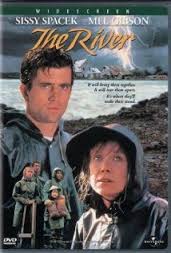
THE RIVER
US, 1984, 122 minutes, Colour.
Mel Gibson, Sissy Spacek, Scott Glenn.
Directed by Mark Rydell.
The River dramatises economic situations in the United States in the early '80s, especially on the land. Other films of this period include Country, Places in the Heart (set in the '30s), Miles from Home. The films are in something of the tradition of The Grapes of Wrath.
The film was directed by Mark Rydell (The Fox, The Cowboys, The Rose, On Golden Pond). It is beautifully photographed (Oscar nomination) and scored by John Williams (Oscar nomination). However, the film looks rather too beautiful for its theme - not rugged enough.
The screenplay has familiar situations, even predictable. Mel Gibson, Sissy Spacek and Scott Glenn do what they can with the characterisations (even Sissy Spacek winning an Oscar nomination). However, the film seems too contrived, sometimes too sentimental, sometimes too predictable. It is interesting to note that the developer, the wealthy man, has the last word. The farmers have a temporary victory.
1. A piece of Americana of the '80s? Economic situations? The land and farmers, the struggle and effort? The old values versus development? Versus enterprise? The quality of the film and its Oscar nominations?
2. Production values: Tennessee, the river and its beauty and ruggedness, the seasons, the farm and the crops? The town and its way of life? The factories? Authentic? Atmosphere and environment? The atmospheric score?
3. The title and the focus: the visual, the flooding, the settling down of the river, its beauty? Symbol? Its effect on the farms, on business? The Garveys and Wade and their attitudes towards the river? Destroying the river, damming it, holding it in? The river conquered - for the time being?
4. The picture of the floods: the credit and the rain, the build-up, the graders, the activity, accidents, Tom and his leg? The trucks, the threat to homes? The friends and the sandbagging? The threat to the crops? The aerial photography of the receding waters? The season and the climax, the angry farmers, tired, Wade and the final confrontation, issues, hunger and the scabs, guns, the four-wheel drive blocking the water, the sandbags and the final stand?
5. The dramatic confrontation between farmers and the wealthy? Tradition, work, families buried in the cemetery, hands-on work versus business? The bank and wealth, loans and refusals? The auctioning of farm goods and family possessions? The Garveys representing the farmers? Wade and his aims, power?
6. Mel Gibson as Tom: his strength, sullen, emotional? The farmers' symbol? Work and his family, serious? The background of May and her friendship with Joe Wade? The flood and his work, the repairs, trying for the loan, his anger with the bank manager, the machine breaking? Going to the factory, discovering himself a scab? The tough work, the rescue of Baines? The strikers spitting at him? The return home, the corn and Wade's men? The lower prices? The baseball scene and his confrontation with Wade? The build-up to the harvest, the floods, his anger, working alone, not wanting help, stance against Wade, the shooting, Baines, the flood and his work? The final sandbag? The harvest? The seemingly happy ending - a future? Or Wade prevailing?
7. May as wife and mother, working with the floods, in the home and her cooking, caring for the children? In town for the loan? Wade and his attention, her choice? By herself, managing the farm, the injury with her arm and her being trapped? Goading the bull to set her free? Visiting Tom? The harvest, the rain, the flood, standing by her husband?
8. The sketch of the children, work, school, the ice cream sequence, baseball sequence, with the machines, the visit to their father? The end and the demands made by Tom on his son? Too much?
9. Wade and his position in the town, piloting the senator, the mill, the prices and the fixing of prices, changing of them? His hold over the bank manager? Trying to persuade the farmers? Relationship with May, wanting things to change? Looking after her in her injury? The flood, getting the scabs and paying them, throwing the final sandbag - but having the final word?
10. Tom's cousin, the job, the foreman and the explanations, the conditions, the tough work, discovering that they were scabs, the fights, the deer coming into the factory and the men chasing it, setting it free, walking the gauntlet and being spat upon? The peaceful demonstration of the strikers? The film's comment on strike-breaking and the scabs coming to help flood the farm?
11. Baines and his hunger, his wife, at the factory, trying to get out, the finale with the sandbag, the shooting, getting the truck and blocking the water?
12. The symbolism of the deer - in the factory, wandering, frightened, chased by the men, their letting it go free?
13. A piece of Americana, the farms of Tennessee, traditional farmers and their stances, progress and industrialisation? The bankers and money?
Published in Movie Reviews
Published in
Movie Reviews
Tagged under
Saturday, 18 September 2021 19:24
Rising Sun
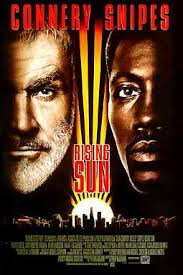
RISING SUN
US, 1993, 129 minutes, Colour.
Sean Connery, Wesley Snipes, Harvey Keitel, Cary- Hiroyuki Tagawa, Kevin Anderson, Mako, Ray Wise, Stan Shaw, Tia Carrere, Steve Buscemi.
Rising Sun is an adaptation of the bestseller by Michael Creighton (the film being released at the same time as Jurassic Park). The film was written for the screen and directed by Philip Kauffman (The Ultimate Lightness of Being, Henry and June, The Right Stuff). The criticism of the film was that it softened Creighton's original attack on the Japanese corporate takeover of America, switching the murderer from a Japanese to an American. However, the film does highlight the differences between East and West, the American way of doing business, tough stances, especially in murder investigations, compared with the reticence and decorum of the Japanese style - nonetheless deadly.
Sean Connery breezes through his role as John Connor, a police expert as well as expert in Asian matters. He is partnered with Wesley Snipes (who appeared in 1992-93 in a range of films including Boiling Point, Passenger 57, Demolition Man). Harvey Keitel appears as a corrupt American cop, Kevin Anderson is the villain. Ray Wise appears as a corrupt senator and Cary- Hiroyuki Tagawa is an ambiguous Japanese in Los Angeles.
The film is basically a police investigation, the contrast between the ways of East and West as well as between black and white in Los Angeles. However, the film has implications for American big business as well as political connections.
1. The popularity of the novel? The critique of the Japanese? Adapted for the screen, the softening of the critique, the changing of the murderer from Japanese to American? Affecting the impact of the film?
2. Los Angeles settings, the world of the Japanese in Los Angeles, the intersecting of Asia and the West? The background of black Los Angeles? The world of big business, hotels, political headquarters, police investigation bureaux? The glossy style? Musical score?
3. The focus on technology and its use, the use of video, aural surveillance, the doctoring of evidence, the ability of machines to tamper with video? The use of technology to incriminate people?
4. The title and the focus on Japan and the US? Japanese ownership of the United States? Big companies? Japanese migrating to America - and adapting to western styles? The credits and the karaoke opening with Eddie and his singing? The Americans having to adapt to Japanese ways? Different ways of doing business, tough action, industrial espionage, respect and decorum? The Japanese corporate bosses, their use of information? Manners? Coping with a crime? Politeness versus LA law?
5. The opening situation: the deals, Richmond and his advice, the political connections, visual and aural surveillance? The stand-offs? The opening of the high-rise building, the party, the impact of the gross murder? The Japanese handling it - especially Ishi Hara and the help of Richmond?
6. Eddie and his world, the nightclubs, girlfriends, music, relationship with Cheryl, his encounters with her? Her going to the party, the sexual encounter, the nature of her death, asphyxiation? Suspicions on Eddie? The video changed to make Eddie guilty?
7. Wesley Snipes as Webb Smith (and the device of his being interrogated and the flashbacks to explain the situation)? His unwillingness to investigate, going, meeting with John Connor? Sean Connery's style? The meeting, working together, the advice of Connor, Japanese customs? Angers and decorum? Breaking out? The collaboration with Tom Graham and his handling of the investigation?
8. Smith and his type, background, racial stances, wit? Going into action - martial arts style? The contrast with Connor - sage, knowing customs, the mystery about him, his story about his relationship and leaving Japan? His giving advice? The irony of Smith being able to get the brothers in East LA to stop the Japanese pursuers?
9. The nature of the evidence, the visualising of the death (and the number of replays), the missing disk, its being replaced, deconstructed and reconstructed?
10. The murder, the cause of death, the breathing, Eddie and suspicions, his escape, the car crash and his death?
11. Connor getting Theresa with her expertise to unravel the tapes? Checking the evidence? Her relationship to Connor, Connor's story - and Smith taking her to Connor's address at the end?
12. The background of the media, Weasel and his investigations, interviews? Warning Smith about corruption investigations? His warning about the gangsters following? The place of the media in collaboration with the police?
13. The senator, his open style, his party machine, the faithful, the rallying and support? His relationship with Richmond? The importance of the corporate deals? The video, the revelation of the truth and his sexual encounter with Cheryl? His suicide?
14. Graham, the collaboration with Smith and Connor, the irony of his being on the take, in collusion with the Japanese, with Ishi Hara in the pursuit of Eddie?
15. Eddie not dead, the shootouts - and his death? Webb saved from the bullet?
16. The revelation of the truth, the senator, the murderer - not Eddie? Richmond hurrying from the room, his attempted escape, the gangsters killing him and burying him in the foundations of the building?
17. Ishi Hara and his manipulations in America, his inability to save the situation, losing face, disgraced and sent back to Japan?
18. Satisfactory resolution, satisfying police investigation, portrait of corporate and political corruption? An interpretation of the influence of the Japanese in the United States in the '80s and '90s?
Published in Movie Reviews
Published in
Movie Reviews
Tagged under
Saturday, 18 September 2021 19:24
Rising Son
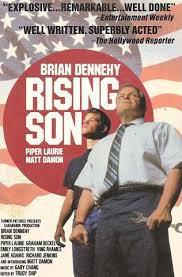
RISING SON
US, 1990, 92 minutes, Colour.
Brian Dennehy, Piper Laurie, Matt Damon, Emily Longstreth, Ving Rhames, Richard Jenkins.
Directed by John David Coles.
Rising Son is a strong family drama, set in the recession of the late 80s and the closure of so many factories (and Japanese takeovers). The title is a play on words on the relationship between father and son as well as echoes of Japan. The film is another tour de force for Brian Dennehy as the union boss risen to management father. Piper Laurie is his wife and Matt Damon is his 19yr old son, forced into college and pre-med studies by the ambitions of his father. The film focuses on the father, Gus, his relationship with his son and his pushing him, the growing tension with his wife as he looses his job and she takes on a job. There is an older son who has been forced into studying law by his father. The film focuses on life in a Pennsylvania town, the tensions in an American family, memories of war (heroic as well as false) and the roles of union and management in the crisis of the 80s.
1. Interesting family drama? Work drama? a piece of Americana?
2. The Pennsylvania town, the factory and its tradition, the technology? Being superseded? Family homes? Diners and shops? Holiday homes? The middle American family? The musical score, songs?
3. The title, the reference to Chris to Charlie? The echoes of Japan? (The Japanese takeover of the firm? Gus's war effort, the medal and the bayoneting of the Japanese - and the truth)?
4. Gus, a big man? Genial, friendly with everyone? His friends in the hotel, Billy, the union members? The management, Tommy? Stop work meetings and his rhetoric with the group? His discovery of the truth about the closure, his animosity towards the Japanese? His growing disheartened? The union meeting, the award and his speech? His pride in his son? His birthday, Danny coming to visit? The birthday cake? Love for his wife, tensions with her? His going to seek employment, the interview about jobs? His age, World War II being out of date? His return, pretending to be sick? The holiday house, fishing with Charlie? Charlie trying to talk with him? His growing brutality, his job with used cars and his trying to pressurise customers? Martha getting a job, his standover tactics with her? His drinking? His demands that she come home? The clash with Charlie, the truth from Charlie? Drinking, taking the gun, going to the lake? Charlie swimming towards - the reconciliation, the telling the truth about his war record and the death of the Japanese? Listening to his son? The crisis, the transformation? Typical father, American father? Changing times?
5. Martha, her love for Gus, support? His thinking her unable to face the truth but her knowledge of what was happening with her children? Out of work, her getting a job, enjoying the job, his coming and demanding that she return? Her refusal? The reconciliation - and her concern with Gus at the lake? Sending Charlie for him? A good woman, the changing times, the image of the American woman and work?
6. The American family: the father and his opportunities, the background of the war, making the most for his sons? Danny and his law studies, practice, his resentment about his life, bewilderment about his marriage? Advice to Charlie? Charlie and his being forced into medical studies, his father's pride?
7. Charlie, his ride home, response to his parents, going to see Carol in the shop, memories of past relationships? His attraction towards Megan? Her visit, meeting his parents (and their quarrel), her trying to support Charlie? His wanting a job, to drop out of his studies? Inability to tell his father? Wanting a job at the factory - and going to the hospital and declining the job his father had arranged? His pride in his father, going to the meeting, having to demonstrate the medical techniques? His trying to play this down on the ride home? The tension with his father out of work, the birthday party, the talking things through with Danny? His telling his father, their clash? The clash on the staircase, Gus hitting his son? Charlie trying to tell the truth? Gus's apology? Charlie swimming to save his father? Their talk together, listening to the truth about his silver star? Gus throwing the bayonet away? A future?
8. Carol, her love for Charlie? Work in the town – wanting to get away from it? The dances? Going out with Charlie, on the bridge? Her telling him about her engagement - and his wanting to know whether she loved the man? The contrast with Megan, the college undergraduate, educated, visiting, her support?
9. Billy, his friendship with Gus? Anger at the paper stand and Gus paying the money? At the bar? His anger with Gus at the cafeteria, thinking he knew the truth about the closure? The fight? His house burning down - and Gus wanting to risk everything to rescue him?
10. The union rep, talking frankly with Gus? The workers on the plant, the stop-work, their reasons? The hopelessness of the situation? The bosses, the executives and their economic rationalism? Tommy and his knowing that the plant was to close? Trying to fight it, unable to do it? His plea for the men and women to get back to work?
11. A satisfying combination of human drama, social observation?
Published in Movie Reviews
Published in
Movie Reviews
Tagged under
Saturday, 18 September 2021 19:24
Right of the People

RIGHT OF THE PEOPLE
US, 1986, 100 minutes, Colour.
Michael Ontkean, Jane Kaczmarek, Billy Dee Williams, John Randolph, M.Emmet Walsh.
Directed by Jeffrey Bloom.
Right of the People is a strong telemovie, focusing on gun control in the United States and the availability of weapons. It gives both points of view. However, it ultimately comes down against the widespread use and availability of guns.
Michael Ontkean portrays a DA whose wife and daughter are massacred in a restaurant. He becomes a demagogue in favour of having arms, leading a political campaign. The film has strong support from M. Emmett Walsh as the mayor and John Randolph as the chief of police.
The film shows what happens in a society where arms are available, an atmosphere of fear, fanaticism, psychotic types taking up arms and becoming heroes, ordinary citizens caught in violent situations. It is worth discussing.
1. The impact of the telemovie? For the American audience? World audiences?
2. The themes of guns and gun control, political stances, legislation? Campaigns? Emotional responses to tragedies? Human nature and violence? The use of arms by unbalanced people? Violence and death?
3. The American city of St Lawrence? Typical American city, citizens, mayor and police chief, DAs? Television stations and interviews? Political campaigns? The people and their taking to guns?
4. Chris and his lectures, the appointment with his wife and daughter, discovering their deaths? His anguished grief at the scene, aftermath? His stances? The support of Alicia? The clashes with the mayor, with the police chief, with his colleagues and his friend?
5. Alicia and Angela, preparing for the outing, discussions? The restaurant, the hold-up, the gun at the daughter, Angela moving the gun, the massacre?
6. The campaign? The hearing and Chris making his speech? The alarm of the councillor and the authorities? The senator and his offer for help? The advertising campaign, slogans and posters? Commercials? The speeches and rallies, the people's response, Chris as demagogue?
7. The television interview with Alicia, her alternate stance? The mayor, the police chief and the police? The councillor?
8. Chris's friend in the force, his attitude, the police attitudes? His having a gun? Discussions with Chris?
9. The passing of the law, the availability of guns, the consequent violence? Each side of the argument presented? The robbers going into the store but afraid when they saw the guns? The nervous woman and her inquiry about a permit, training? The young man and his imitating screen heroes, armed, shooting the robbers - and the debate about whether he should be awarded a medal, his receiving of the medal? The old man and the drawing of guns in shops? Tension in the bars with everybody looking at their guns?
10. Chris and Alicia and their discussions, his having second thoughts, blaming himself?
11. Alicia and her perspective? Audiences identifying with her?
12. The title of the film, the relationship with the American Constitution, the bearing of arms, the availability of arms?
Published in Movie Reviews
Published in
Movie Reviews
Tagged under
Saturday, 18 September 2021 19:24
Ricochet
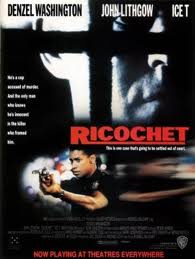
RICOCHET
US, 1991, 102 minutes, Colour.
Denzel Washington, John Lithgow, Ice T, Kevin Pollak, Lindsay Wagner.
Directed by Russell Mulcahy.
Ricochet is a tough police thriller with a genial hero, Denzel Washington, and an over the top villain, John Lithgow. The film highlights the black hero - it is in line with a number of films of 1991-92 which were designed for a black audience (Rage in Harlem, New Jack City, The Boys in the Hood). Ice T appears in the cast, as does John Amos. However, with Lindsay Wagner as the district attorney, the film aims for a wider thriller audience.
The film is full of action, shows Washington as a daring rookie policeman who confronts a psychopath. When the psychopath escapes from jail and fakes his own death, he goes after the rookie who has become a prominent policeman in the city. The struggle between the two, especially with dirty tricks and video manipulation by the villain, Washington's reputation is ruined. However, there is a final, almost literally over the top, finale on towers with the villain getting his comeuppance - or coming down. The film is directed by Australian Russell Mulcahy, director of video clips and the film Razorback as well as the two Highlander films.
1. For what audience was the film made? American audiences, overseas? For American black audiences, sympathetic to the hero and the situations?
2. The flashy style of the film? Action sequences, stunt work and effects? The American city, ordinary situations, violent situations in the streets? The finale?
3. The title, the indication of theme - Nick Styles and his gun? Earl Blake and his revenge? Firing and the danger of ricochet?
4. The focus on Nick Styles and Denzel Washington's screen presence? Rookie, working and the police, the basketball - and his friends with their drug-running connections? The confrontation with Earl Blake, calming him down, Blake taken hostage, Styles stripping and having the hidden gun? The video and the response of the district attorney? Her interview with him in the locker room? The decision by the authorities to use him for promotion? Advertising? His meeting with Alice, the marriage, the daughters? His budding career? His city rejuvenation work? His colleagues?
5. Blake, John Lithgow and his manic style? In prison, fellow prisoners, getting his collaborators? The neo-fascist Arian Brotherhood? His observation of Styles? His vengeance? The escape plan, the police finding the body, Blake believed to be dead? His hiding out and planning the revenge?
6. The telethon, the success of Styles? His father's presence? The phone call from Debbie, the babysitter upset? The arrival of the power man? Blake and his sinister presence, drugging the babysitter, making a video of himself with the axe and the sleeping girls?
7. Blake and his manipulation of Styles, the murder of Farris, hanging, in drag, suggestions of involvement in child pornography? The missing money? Styles under suspicion? The district attorney and the authorities questioning him? His being kidnapped, Blake injecting him with drugs, the incriminating video with the prostitute, the dubbed voices? His being dumped in the courthouse?
8. The reaction of the authorities, the district attorney and her scepticism? Styles trying to prove his innocence, the video with Blake wielding the axe being substituted by Styles with the prostitutes? His having contracted venereal disease, Alice and her reaction?
9. The role of the media, the commentaries, criticisms of Styles? The expose with the video?
10. Styles' final decision, the confrontation with Blake? Hiding his wife and children with Odessa - the crack dealer? His setting up the crack house roof? The suicide threat? On the media? Blake and his anger, mania? Climbing the tower? The confrontation between the two, the fight? The electrifying of the tower? Blake's death?
11. Styles and his rehabilitation, his reconciliation with his wife and children? His ruining the television reporting and getting his comeuppance on the treatment by the media? The flip ending?
12. Popular entertainment, urban violence, the role of the police, criminals, framing police and making them victims? Violent confrontations and solutions?
Published in Movie Reviews
Published in
Movie Reviews
Tagged under
Saturday, 18 September 2021 19:24
Richie Rich
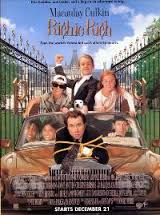
RICHIE RICH
US, 1994, 94 minutes, Colour.
Macauley Culkin, John Larroquette, Edward Hermann, Christine Ebersole, Jonathan Hyde.
Directed by Donald Petrie.
Richie Rich is a star vehicle for Macauley Culkin. After his successes with Home Alone and Home Alone 2, his films were less successful: The Good Son, Getting Even with Dad, The Pagemaster. However, Richie Rich suits his screen presence. The film was based on comic strips and television shows. He is the richest boy in the world - except that he has no friends.
The film delights in presenting the affluence of the Rich family, the parents doing satiric turns, Edward Herrmann and Christine Ebersole. The villain is played with relish by John Larroquette. Jonathan Hyde also enjoys himself as a very English butler.
The film shows the wealthy family, Richie and the enclosed world of the Rich, his making friends, the disappearance of his parents, the villainy of John Larroquette - and his comeuppance. There is a film quote from North By Northwest which prepares us for the climax, a parody of North By Northwest as the family and villain chase each other over Mount Rushmore.
1. Comic strip fairy tale? American style?
2. Macauley Culkin, his popularity, children's audiences, adults'?
3. The picture of the estate and its wealth, the building, exteriors and interiors, the grounds? The city offices? The laboratories? The special effects and the jokes? The computer techniques?
4. The title and its focus, audiences identifying with Richie and his family? Fairy tales and dreams?
5. Cadbury as the very English butler, his introduction, the overview of Richie's birth, as a baby, growing up with wealth, playing with money, his vocabulary, baseball with his father, cars and all the trappings?
6. Richard and Regina, their love for each other, their style, sensible and silly? Consultation about Richie? The work, finance, advice to the President? Entertaining at home? The formal meals? Dad and his computers - and always able to be located (even when consulting the President)?
7. Richie and Cadbury, the exacting timetable, the classes, going to the factory and making the speech, the gift of the tools? Chemistry lessons and the professor - and the invention of the bee? The setting up of everything for the climax, the bee, the glue etc? The machine which made the wrong products?
8. The plane ride, Richard and Regina going to England to see the Queen? Cadbury enabling Richie not to go? The chocolates, the crash, Richard and Regina adrift in the sea, champagne, finding her suitcase, the computer, getting the signal to work, being rescued - but captured by the villain?
9. Richie and Cadbury, Richie wanting to play baseball with the kids, the bet and his winning, their reaction? Their coming for the day, the arrival, play, roller coaster (and editing of the plane crashing)? Food? Their being paid by Cadbury?
10. Van Dough and Ferguson as villains, Ferguson as the bodyguard, nasty, the bomb on the plane, his dominance of Richie? Van Dough and the meal, the takeover?
11. Richie as the successful businessman, the factories, his name on the magazines, his photos, profits rising, the board meetings? The fairy tale of the child being so successful at business? Cadbury and his being framed, going to prison? The professor and his overhearing the villainy - using all his techniques: the glue, the bee, the machine? The confrontation with Van Dough?
12. The computer, information about where Dad was? Richie being trapped?
13. Diane, Gloria and the kids, their relationship with Richie? Diane and Cadbury? The kids going to the mansion, the strategy, the attack, their techniques to outwit Van Dough? Television?
14. The vault, the professor, the glue and the bedpans?
15. The finale and the chase over Mount Rushmore? The parody of North by Northwest?
16. The happy ending, Richie as rich but rich in having friends?
Published in Movie Reviews
Published in
Movie Reviews
Tagged under
Saturday, 18 September 2021 19:24
Rough Night in Jericho
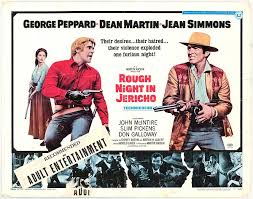
ROUGH NIGHT IN JERICHO
US, 1967, 97 minutes, Colour.
George Peppard, Dean Martin, Jean Simmons, John Mc Intire, Slim Pickens, Don Galloway, Brad Weston.
Directed by Arnold Laven.
Rough Night in Jericho is a strong western movie of the late '60s, a period when violence was becoming more explicit on the screen. George Peppard appeared in many such westerns at the period, as did Dean Martin. Jean Simmons is the surprising heroine. The supporting cast includes regulars like John Mc Intire and Slim Pickens.
It has the familiar ingredients: the western town, corrupt authority, the stranger-hero, stagecoaches, cattle ranches. The film was directed by Arnold Laven, producer and director of many action films.
1. Interesting and entertaining western? Familiar material? '60s style? Tough?
2. Wide screen photography, locations? Musical score? The stars?
3. The title and expectations? Jericho as the town, the inhabitants, their conflicts? The violence?
4. Dean Martin as Flood: the shooting of the marshal, his place in the town, his henchmen, cattle? Relationship with Molly? The conflict with Dolan? Justice, hangings? Henchmen? Fights? The final cattle roundup? The final confrontation? Flood as the self-made man, the ambitious villain?
5. George Peppard as Dolan: the quiet hero, travelling in the town, relationship with Flood, with Molly? With the marshal? The gambler? His involvement, the final confrontation? The hero?
6. Molly, her position in the town, past relationship with Flood, antagonism? Attraction towards Dolan? Looking after the marshal? Issues and confrontations? The drunk scene? The next morning? The final battle?
7. The marshal, the ambush, his being wounded, in the town, conflict with Flood? Friendship with Dolan? His death?
8. The various men in the town, their stances, loyalties? Flood and Dolan? Double-dealings? The cattle?
9. The background of justice in the western towns? Official law and order? Ambitions? Violence? The cattlemen? The gamblers? The American heritage?
Published in Movie Reviews
Published in
Movie Reviews
Tagged under